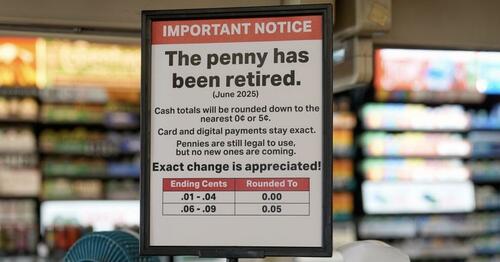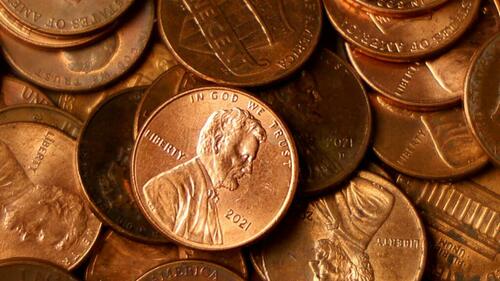Two months after the US Mint stopped churning out pennies, American retailers are feeling the pinch as a shortage of the coins is compelling many of them to round prices down on cash transactions -- a practice that could start adding up over time and leave a mark on their bottom lines. Wary of angering customers by rounding up -- and running afoul of state and federal laws that complicate rounding in either direction -- companies are pursuing creative solutions while begging for federal intervention.
There are about 165 Federal Reserve coin terminal facilities in the country, where banks deposit excess coins or withdraw coins as needed. More than 60 of these coin facilities have now halted penny transactions altogether, according to the American Bankers Association. That's starting to cause major headaches for businesses in various locations across the country.

In a statement issued this week, McDonald's was one of the latest retailers to publicize their dilemma:
"Following the discontinuation of pennies nationwide, some McDonald’s locations may not be able to provide exact change. We have a team actively working on long-term solutions to keep things simple and fair for customers. This is an issue affecting all retailers across the country, and we will continue to work with the federal government to obtain guidance on this matter going forward.”
McDonald's told USA Today that its restaurants that run out of pennies are rounding either up or down to the nearest nickel. In contrast, KwikTrip is among those only rounding down to the nearest five-cent interval, steering clear of potential controversy. (We await viral video of an irate woman -- after having her price rounded up two cents -- hurling condiments at a McDonald's cashier while clutching an infant.)
There's more than potentially angry customers in the mix: Rounding could put retailers in legal jeopardy. For starters, federal laws prohibit price differences for SNAP (nee "food stamp") customers. Meanwhile, many states have laws requiring exact change and/or prohibiting charging different prices for cash transactions, which could push penny-poor retailers to change their pricing increments so everyone's bill ends up at a nickel interval, with the need to account for sales taxes as they do their calculations. The National Retail Federation is pushing the White House and Congress to issue guidance or pass laws to override state regulations that are compounding their headaches.

The National Association of Convenience Stores is also asking for federal help:
“Businesses are desperate for Congress to address this issue by passing a law allowing them to round to the nearest nickel. Without federal legislation, businesses are left in the impossible position of trying to figure out what to do and at risk of being out of compliance with other laws. We urgently need Congress to act,” said NACS strategic advisor Anna Ready Blom.
In the meantime, businesses are trying to ease the penny crunch in a variety of ways. That starts with posting notices to alert you to their shortage up-front, and urging you to pay with a credit or debit card (or, where applicable and eligible, to swipe your EBT.) At a Pennsylvania location, Reuters observed a Sheetz gas station encouraging customers to round their purchase up and donate the difference to charity.
Working on the supply end, the same Sheetz store was offering a self-serve drink at the price of 100 pennies. The Giant Eagle supermarket chain declared Nov 1 a "Penny Exchange Day," issuing a store gift card valued at twice the value of the pennies submitted. Customers could bring in up to $100 in pennies, for which they'd receive a $200 gift card. It looks like it was a hit:
There are some 250 billion pennies in circulation, equivalent to about 700 per American. "It’s not a shortage in the traditional sense—there are plenty of pennies out there," notes the American Bankers Association. "But circulation is slowing down. Many people stash pennies in jars or drawers, and without new ones being minted, banks and retailers are relying solely on recycled coins."
In February, President Trump ordered Treasury Secretary Scott Bessent to stop making pennies. Explaining the move on social media, Trump wrote, "For far too long the United States has minted pennies which literally cost us more than 2 cents. This is so wasteful! I have instructed my Secretary of the US Treasury to stop producing new pennies. Let's rip the waste out of our great nations budget, even if it's a penny at a time." The US Mint reported last year that it cost 3.69 cents to produce and distribute a penny. In terms of the difference between the monetary value of the final product and the production cost, the Mint's FY 2024 loss on penny-production was about $85.3 million.
Trump's move followed similar eliminations of lowest-denomination coins by countries like Canada, Australia and New Zealand. Note that the penny has not been officially eliminated: Trump merely ordered the Mint to stop producing them. Final constitutional authority rests with Congress.
Loading recommendations...